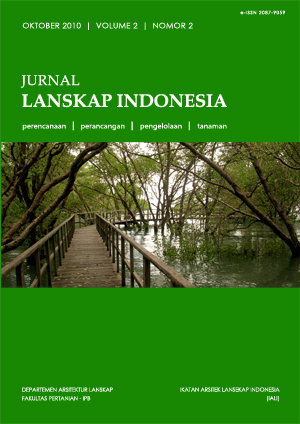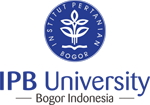DEVELOPING TOURING PLAN USING GEOGRAPHIC INFORMATION SYSTEM BASED ON VISUAL, NATURAL, AND CULTURAL QUALITIES IN PARANGTRITIS COASTAL AREA, YOGYAKARTA, INDONESIA
Abstract
The objectives of this study is studying on developing touring plan in coastal area of Parangtritis based on its visual, natural, and cultural quality assessment. Those three aspects of quality are used as the basic consideration for site assessment in acquiring the potential tourism area, which is subsequently used in developing a touring system.
Scenic Beauty Estimation (SBE) method and visual character variables assessment are used in assessing the visual quality of the study area. The technique of potential zones mapping applied by Gunn (1994) combined with cartographic regionalization (Smith, 1989) are used in assessing both natural and cultural quality of the area.
In general, Parangtritis is dominated with high to medium quality of potential area for tourism, which includes beach, sand dunes, woodlands, and a big part of agriculture area. Based on potential area and existing tourism objects, there are three track alternatives that have been developed in this study by using the concept of developing an interpretive track, as adopted from Damayanti (2003).
According to the prioritizing process using Analytical Hierarchy Process (AHP), the third alternative of touring plan, whichhas the highest priority for the criteria of educational benefits, is perceived to be the most preferable alternative as the potential tourism network in Parangtritis Coastal Area.
Downloads
This journal permits and encourages authors to post items submitted to the journal on personal websites or institutional repositories both prior to and after publication, while providing bibliographic details that credit, if applicable, its publication in this journal. However, after the article is submitted and published in this journal, it is fully copyrighted by the Jurnal Lanskap Indonesia or JLI. If excerpts from other copyrighted works are included, the author must obtain written permission from the copyright owner and give credit to the source in the article. Then, the writer or reader is allowed to copy, share, and redistribute articles/material in any form. But it must still include the appropriate source and credit because the article in this journal is licensed by Creative Commons Attribution 4.0 International License (CC BY 4.0).
I. Proposed Policy for Journals That Offer Open Access
Authors who publish with this journal agree to the following terms:
- Authors retain copyright and grant the journal right of first publication with the work simultaneously licensed under a Creative Commons Attribution License that allows others to share the work with an acknowledgement of the work's authorship and initial publication in this journal.
- Authors are able to enter into separate, additional contractual arrangements for the non-exclusive distribution of the journal's published version of the work (e.g., post it to an institutional repository or publish it in a book), with an acknowledgement of its initial publication in this journal.
- Authors are permitted and encouraged to post their work online (e.g., in institutional repositories or on their website) prior to and during the submission process, as it can lead to productive exchanges, as well as earlier and greater citation of published work (See The Effect of Open Access).
II. Proposed Policy for Journals That Offer Delayed Open Access
Authors who publish with this journal agree to the following terms:
- Authors retain copyright and grant the journal right of first publication, with the work after publication simultaneously licensed under a Creative Commons Attribution License that allows others to share the work with an acknowledgement of the work's authorship and initial publication in this journal.
- Authors are able to enter into separate, additional contractual arrangements for the non-exclusive distribution of the journal's published version of the work (e.g., post it to an institutional repository or publish it in a book), with an acknowledgement of its initial publication in this journal.
- Authors are permitted and encouraged to post their work online (e.g., in institutional repositories or on their website) prior to and during the submission process, as it can lead to productive exchanges, as well as earlier and greater citation of published work (See The Effect of Open Access).



























